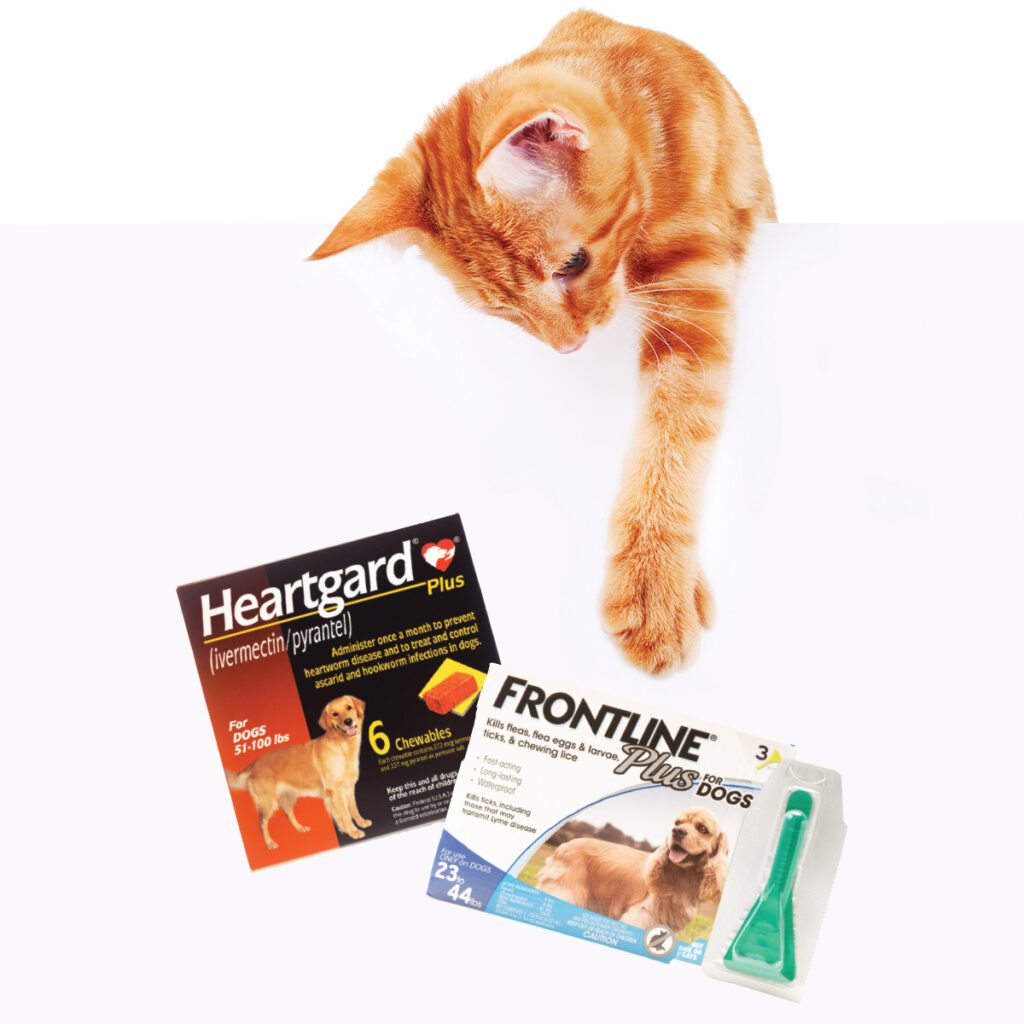How to Keep Your Pets Safe from Fleas, Ticks, & Heartworms
With warmer weather comes more play-time outside for pets. But that also means insects are coming back in full force. Some of the most common issues pet owners face in warmer months are fleas and ticks. And one of the scariest threats that owners work to prevent is heartworms. Local experts, Dr. Anthony Ashley of Animal Clinic Inc. of Chattanooga and Dr. Jordan Mracna of NorthShore Pet Wellness Center, explain what owners should know about these pesky summer parasites and the importance of prevention!
Fleas
What are they?
Perhaps the most common of annoyances for pet owners, fleas are those elusive, tiny, black specks that lead to endless scratching and discomfort for your loved one. These pests have a four-stage life cycle, from egg to larva to pupa to adult, and can be easily contracted while your pet is outside this summer. So, it’s important to understand the best ways to prevent them, as well as how to treat your pet if fleas are contracted.
What can I do to prevent fleas?
As Dr. Mracna says, “Prevention is paramount to helping maintain a pet’s overall health, right up there with routine vaccinations to prevent common disease.” So what is the best method of prevention for fleas?

There are three steps to prevention: flea prevention for your pet, preventative flea treatments for your home, and flea prevention for your yard. For your pet, four different approaches are generally used to prevent fleas. These include oral products, topical preventatives, injectable medications, and collars. There are pros and cons for each of these treatments. The active ingredients in each of these may vary and can impact your pet’s health – for example, products containing permethrin can be deadly to cats. The best options for your dog or cat should be determined with a veterinarian. The most effective steps for prevention are those that kill fleas at all stages of their life cycle.
As Dr. Ashley explains, “Oral medications are generally safer since they are approved by the Food and Drug Administration (FDA). Topical medications and collars are generally safe and effective, too, but are considered pesticides by the Environmental Protection Agency.”
In your home, it’s important to steam clean periodically, especially carpeted areas. There are also preventative sprays you can use on furniture and rugs to deter flea infestations. In your yard, cleanliness is also key. Keep areas that your pet frequents free of debris, and grass trimmed short.
How can fleas be treated?
If you fail to prevent flea infestation in your dog or cat, the risks are not as severe as some parasites, but are still of concern. Fleas can cause anemia (a condition caused by low red blood cell count resulting in weariness). They also can carry diseases, transmit parasites such as tape worms, and cause extreme discomfort for your pet.
If your pet has contracted fleas, it’s important to treat the situation quickly to avoid infestation. Female fleas can lay anywhere from 50 to 100 eggs each day. And while baths with flea shampoos or dish soap work to kill adult fleas, the fleas at other stages of life, such as larva or egg, will return and re-infest your furry friend. So, it is important to take the steps noted above and, after consulting with a veterinarian, aggressively use your choice of shampoos, dips and rinses, powders, or sprays to quickly rid your pet of these pesky insects. You should also note that, once your pet has carried fleas inside, they love to nest in carpet and bedding. That means you’ll want to treat your house, too. Because of their four-stage life cycle, it takes months to completely rid your pet and your home of fleas. Prevention is much easier and longer lasting.
Ticks
What are they?
One of the least appealing problems to address with your pet is a tick or two. These arachnid blood-suckers are nasty business that can carry and transmit deadly diseases. They latch on to a host by embedding their head under the host’s skin to feed on his or her blood.
Ticks will often attach to your pet outside, in tall grass and brush or while your pet is under trees. You should always give your dog or cat a quick exam when they come back inside. Sometimes a simple glance and brush through their fur is all it takes to spot a tick. And if you find it before it completely embeds into your pet’s skin, it is much easier and safer to remove.
Ticks can cause skin irritation, localized hair loss, and general discomfort for your pet.


However, the most worrisome issue with ticks is their ability to transmit numerous diseases including Rocky Mountain spotted fever and Lyme disease which can be fatal if left untreated.
How can I prevent ticks?
Similar to fleas, it is important to treat the outdoor environment and your pet. For your pet, oral products, topical preventatives, and collars are available to prevent ticks from attaching to your pet. Many experts believe that oral medications are still the best option. If a tick attaches to an animal on preventive medication, it will die and fall off.
During the summer you should check your dog or cat for ticks often, especially if they’ve been outside. To check your pet, simply pet them and move fur back to view down to the skin. But, as Dr. Mracna explains, “Ticks will often get into strange places, including in the ear canals, on eyelids, and even along the gums. So if you see your pet behaving oddly or scratching somewhere incessantly, check it for the presence of a tick or other irritant.” Dr. Ashley also points out that, “Engorged ticks are fairly easy to see, but nymphs (immature ticks) and non-engorged adults can be difficult to see. They’re commonly found between the toes and in armpits as well.”
How can ticks be treated?
If you find your pet has a tick or ticks, you should consult with your veterinarian and use shampoos, dips and rinses, powders, or sprays to quickly kill any and all ticks. While ridding your pet of these pesky critters it is important to remove each tick from your pet. When doing so, it is essential to remove the entire tick. According to Dr. Mracna, “Oftentimes the head and mouth parts of the tick are left embedded in your pet’s skin which can still transmit disease and cause irritation.” If you’re afraid you won’t be able to remove the whole tick, take your pet to their veterinarian.
Heartworms
What are they?
Some of the most severe parasites that your pet can contract are heartworms. Heartworms are spread through mosquito bites. These worms infest your pet’s heart and related blood vessels causing massive amounts of organ damage including lung and heart failure. They affect dogs much more seriously than they do cats.
The disease often progresses without showing obvious symptoms for a long time, and is often fatal. While treatment is available, the expense and complications of heartworm treatment can be daunting for some owners, which is why prevention is critical.
What can I do to prevent heartworms?
The good news is it’s fairly easy. Oral medications administered about once a month, or vaccinations once every six months are the most highly recommended methods of prevention. These options are much more effective and much less costly than treating heartworms.
“Heartworms are spread through mosquitoes, which are more active at dusk and dawn. Mosquitoes are most common within 300 feet of water, and water sources might be obvious like a stream or lake, but they can also be less noticeable like a bird bath or empty flower pot,” Dr. Ashley tells us.
In addition to preventative medications, you can do a few things around your home to help keep your pets safe from heartworms. Empty containers outside your home that hold water after a rain. This might be wheelbarrows, spare tires, or buckets. Provide fewer breeding grounds (water sources) for mosquitoes to reduce your pets’ exposure to them. You can also keep your pet inside while mosquitoes are at their most active. There are even FDA-approved bug repellants that you can use on your dog or cat to deter mosquito bites.
How can heartworms be treated?
If you’re concerned that your pet may have heartworms, you should visit a veterinarian immediately. A simple blood test can determine if your pet has them. If the test is positive, your veterinarian may recommend a course of antibiotics and steroids before beginning drug injections that kill the worms. Injections include one to start, and then a month later two more are given within 24 hours of each other. To reduce the risk of complications, it’s essential that your dog is restricted to limited exercise while undergoing treatment and for a period of time afterward.
Dr. Mracna says, “If a dog is already showing signs of congestive heart failure from the heartworms, then this damage is irreversible. The treatment can stop any further progression, but likely other medications will still be needed to manage heart failure.” Which is why prevention is so important. Dr. Ashley adds, “Unfortunately, as the heartworms die, they can actually make your pet worse before they get better.”
The good news is that these complications can usually be avoided if the disease is caught at an early enough stage.


Dr. Jordan Mracna
Veterinarian, NorthShore Pet Wellness Center, Chattanooga Veterinary Network


Dr. Anthony L. Ashley
Co-Owner and Veterinarian, Animal Clinic Inc. of Chattanooga

